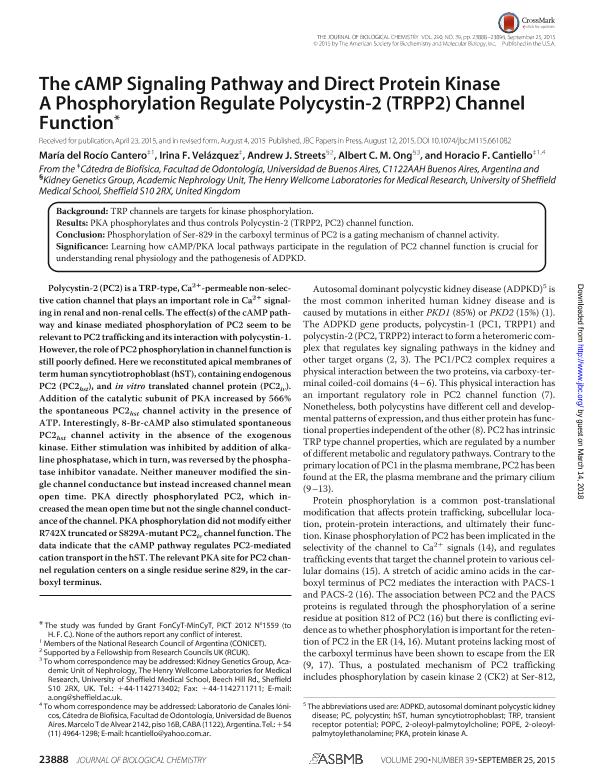Artículo
The cAMP Signaling pathway and direct protein kinase a phosphorylation regulate polycystin-2 (TRPP2) Channel Function
Cantero, Maria del Rocio ; Velázquez, Irina Florencia; Streets, Andrew J.; Ong, Albert C. M.; Cantiello, Horacio Fabio
; Velázquez, Irina Florencia; Streets, Andrew J.; Ong, Albert C. M.; Cantiello, Horacio Fabio
 ; Velázquez, Irina Florencia; Streets, Andrew J.; Ong, Albert C. M.; Cantiello, Horacio Fabio
; Velázquez, Irina Florencia; Streets, Andrew J.; Ong, Albert C. M.; Cantiello, Horacio Fabio
Fecha de publicación:
09/2015
Editorial:
American Society for Biochemistry and Molecular Biology
Revista:
Journal of Biological Chemistry (online)
ISSN:
0021-9258
Idioma:
Inglés
Tipo de recurso:
Artículo publicado
Clasificación temática:
Resumen
Polycystin-2 (PC2) is aTRP-type, Ca2+-permeable non-selective cation channel that plays an important role in Ca2+ signaling in renal and non-renal cells. The effect(s) of the cAMP pathway and kinase mediated phosphorylation of PC2 seem to be relevant to PC2 trafficking and its interaction with polycystin-1. However, the role of PC2 phosphorylation in channel function is still poorly defined. Here we reconstituted apical membranes of term human syncytiotrophoblast (hST), containing endogenous PC2 (PC2hst), and in vitro translated channel protein (PC2iv). Addition of the catalytic subunit of PKA increased by 566% the spontaneous PC2hst channel activity in the presence of ATP. Interestingly, 8-Br-cAMP also stimulated spontaneous PC2hst channel activity in the absence of the exogenous kinase. Either stimulation was inhibited by addition of alkaline phosphatase, which in turn, was reversed by the phosphatase inhibitor vanadate. Neither maneuver modified the single channel conductance but instead increased channel mean open time. PKA directly phosphorylated PC2, which increased the mean open time but not the single channel conductance of the channel. PKA phosphorylation did not modify either R742X truncated or S829A-mutant PC2iv channel function. The data indicate that the cAMP pathway regulates PC2-mediated cation transport in the hST. The relevant PKA site for PC2 channel regulation centers on a single residue serine 829, in the carboxyl terminus.
Palabras clave:
Cyclic Amp (Camp)
,
Electrophysiology
,
Placenta
,
Protein Kinase a (Pka)
Archivos asociados
Licencia
Identificadores
Colecciones
Articulos(OCA HOUSSAY)
Articulos de OFICINA DE COORDINACION ADMINISTRATIVA HOUSSAY
Articulos de OFICINA DE COORDINACION ADMINISTRATIVA HOUSSAY
Citación
Cantero, Maria del Rocio; Velázquez, Irina Florencia; Streets, Andrew J.; Ong, Albert C. M.; Cantiello, Horacio Fabio; The cAMP Signaling pathway and direct protein kinase a phosphorylation regulate polycystin-2 (TRPP2) Channel Function; American Society for Biochemistry and Molecular Biology; Journal of Biological Chemistry (online); 290; 39; 9-2015; 23888-23896
Compartir
Altmétricas



